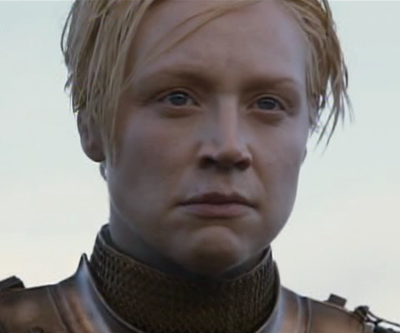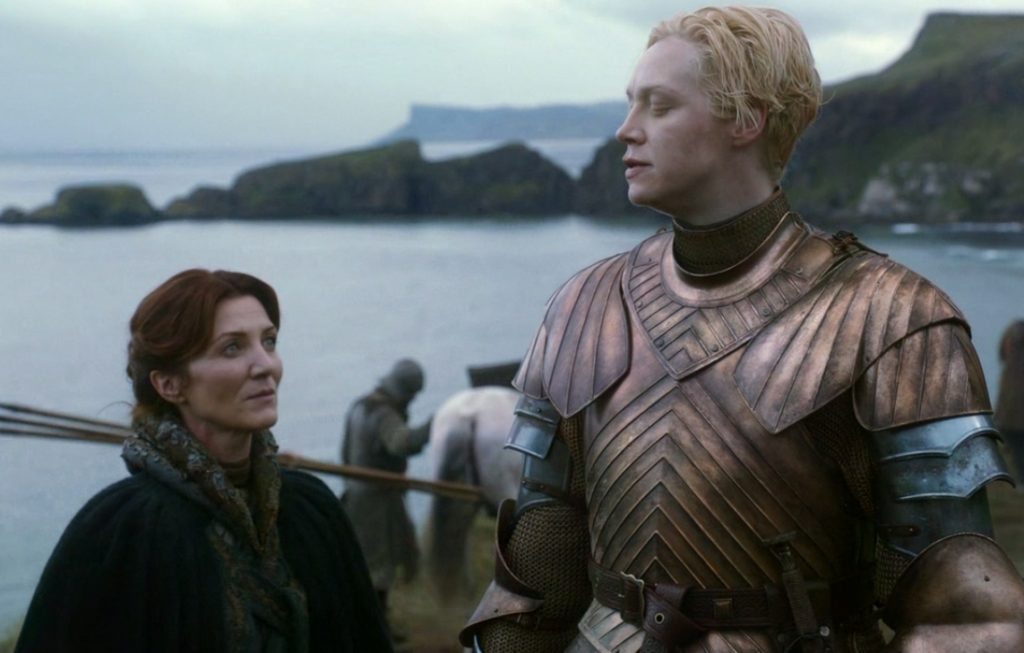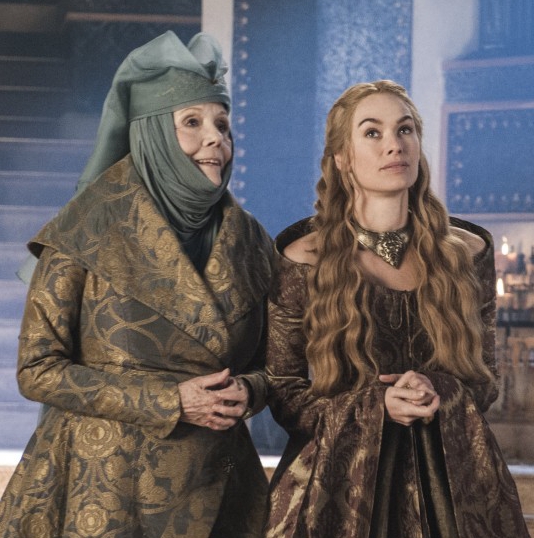It’s Not Misogyny, it’s Feminism – A Song of Ice and Fire
This post about A Song of Ice and Fire contains details of events through A Dance With Dragons. Spoilers ahead!
A Song of Ice and Fire is a pulp fantasy series, that’s impossible to deny. It’s chock full of dragons, magic and spectacular beards swinging big swords. But ASOIAF is also a very deliberate deconstruction of the fantasy genre. Unfortunately, within that deconstruction is where a surprisingly common and very misguided call of ‘misogyny!’ come from. The thing is, ASOIAF needs to retain the fantasy tropes we fantasy fans have been seeing for years, in order to deconstruct and subvert. But it’s hard to look past some of these tropes – it’s hard to look past a society predominantly run by men, in a world where most of the powerful characters are men, where terrible things happen, with high frequency, often to women.
But what needs to be understood is that there is misogyny in ASOIAF, but this is not to say that ASOIAF is misogynist. There is a huge difference in containing and being, and in the breadth of that difference is why ASOIAF is actually a very progressive study of feminism in a genre that’s been plagued with problems portraying female characters for as long as it’s existed. This is what deconstruction and subversion is all about, and we have to look at the nuances in the big picture.
Westeros is a society of institutionalized misogyny. What power women are accorded in Westerosi society is largely only what power their blood and bodies give them – a good marriage prospect and the ability to deliver sons. The feminism here plays when we experience how the female characters deal with their place inside and outside of this society. The important part about female characters in ASOIAF is that they are people, with the strengths or weaknesses any person might have.
Most importantly to the idea of ASOIAF being a feminist work is that these female characters aren’t weak because of their gender.
Let’s look at two female characters in very similar positions in high Westerosi society. Cersei Lannister is easy to write off at first glance as fulfilling a common and frustrating stereotype we see every day and not just in fiction – the ‘women are crazy’ trope. But Cersei isn’t crazy because she’s a woman – Cersei’s multi-book breakdown is due to her paranoia, her hubris and her painfully strong desire to prove herself, especially to the powerful men in her life, like her father and husband. But Cersei doesn’t need to prove herself; there’s nothing in the books condoning this behavior of her’s.
In fact, Olenna Tyrell (nee Redwyne), the Queen of Thorns, is the perfect example of why Cersei’s thirst to prove herself to the men in her life is unnecessary. Olenna Tyrell has ceased having any fucks to give about proving herself to anyone, much less the men in her life (whom she pretty clearly views as ridiculous, anyway). The Queen of Thorns knows how to play the game of thrones and she knows how to win; she wins because she is ruthless, brilliant and knows how to climb the ladder that is chaos. Cersei, meanwhile, becomes a slave of chaos as she breaks down over the course of the series, but Olenna is a manipulator of chaos. Neither woman is ruled by their gender, but Cersei uses being a woman in Westeros’s misogynist society (“I should wear the armor and you the gown”) as an excuse to avoid her own faults and weaknesses.
The society of Westeros is the problem, which is the trope ASOIAF is deconstructing – the magical fantasy realm full of knights and chivalry. But what is chivalry in Westeros? To quote from a very well written analysis:
“What the books demonstrate time and again is that it’s not just Brienne who is betrayed by the social system. No woman, even those who conform to gender norms, can rely on the codes of chivalry for protection because those codes can only be enforced by men. The social system that promises to protect women with male strength actually condemns them to be completely vulnerable to male violence.”
This chivalrous social system is not at all glorified in the series, but is instead shown to be degenerate, corrupt and breaking apart further and further as more swords join the storm and more kings clash on the fields of the smallfolk. As Westeros is torn between the forces of fire and ice, there are female characters on all fronts of the conflicts in the book; women and girls who live within the system, fight to break out of the system, use the system to their own gains and even struggle mightily to bring down the system. These women are as nuanced, detailed and well-written as the male characters, never shown to be better or worse than any man for the sake of their gender.
There is a great deal of fantasy that struggles with a fair, well-written portrayal of female characters. We should absolutely be cognizant and angered by misogyny in the genre (or, for fuck’s sake, anywhere) and unfortunately, there’s a lot of it. Thanks to the success of the television show, A Song of Ice and Fire is the most mainstream, attention-grabbing fantasy property since Lord of the Rings and I’m happy to say that my favorite series isn’t just another entry on the long list of misogynist fiction. Instead A Song of Ice and Fire is a progressive, multifaceted and excellent study of the tropes that cause and sustain these problems in fantasy. ASOIAF is breaking the mold, not conforming to it.







How is it possible that your article is bereft of comments when it’s by far one of the best on the subject of ASIoF and feminism?
Besides all of the obvious points of the strong female characters, you have to be a special kind of cherry-picker to believe there’s of misogyny in these books. People talk about rape constantly, but as we all know, words are wind, and far more horrible things happen to men in these books, far more frequently. Or am I the only person who read the part about an army of genitally mutilated men? How many women have had their limbs cut off? How many women have been flayed? How many women have been beheaded? How many women have had swords come out their mouths? How many women have had their body parts sewn to a wolf corpse? How many women have been burned alive? How many baby girls have been fed to monsters? How many little girls have been paralyzed after being thrown out of tower windows? How many women have had molten gold poured down their faces? If you actually start a tally you see that there are actually far more bad things happening to men in these books, far more frequently.There’s really only a few women that have had truly terrible things happen to them.No, I don’t want to get gang raped in a riot. But truth be told, I’d choose the fate of Lollys Stokeworth or Taesha over any of the gory male fates I just described.
AND
Every king who disrespected the women around him is dead (Mad King, Robert, Joffrey). Every King who acknowledged the power of the women around him is still alive (Stannis, Mance).That says something.
AND
Women of Westeros who step outside of gender roles are rewarded, the ones who don’t are punished. Dani, Arya, Brianne… their lives are full of hardship, but they are far more respectable characters than Cersei, who is too stupid to think outside of rigid gender binaries even as she curses them, and Sansa. That is progressive.
Generally, when men fuck over women, they get their comeuppance. Joffrey was a prick and a threat to Margeary. Likely murdered by the Tyrells. Viserys didn’t recognize Dany’s worth, he got his crown of gold. Arya is killing off her captors bit by bit. Cressen tries to poison Melisandre, dies instead. So on and so forth. Lest I be accused of cherry picking, since just about everyone in the book dies a violent death, not just the ones who fuck over women, lets look at everyone who has tried to take Dany’s dragons.
Pyat Pree- tried to take teh dragons, dies a fiery death.
Kraznys mo Nakloz- tries to take a dragon. dies a fiery death.
Quentyn Martell- tries to tame the dragons, dies a fiery death.
Khal Pono was a prick to Dany, and has not yet died a fiery death. However, as the Dothraki respect strength and a good rider above all else, I have some predictions for what’s going to happen when he stand son his horse and stares down her on a dragon.
Am I crazy, or is there a pattern? Claims of misogyny in the books are utterly baseless. If they were any more feminist they’d be utterly saccharine.